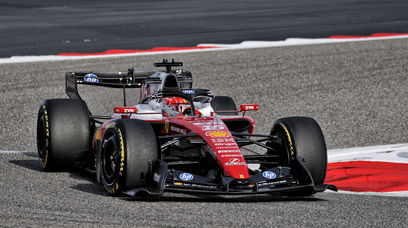As the Racing Director for Formula 1's most famous team, Laurent Mekies has provided an insight into his role at Ferrari and the challenges he faces. Since joining in 2018, Mekies has been part of the team that has dragged Ferrari back in to race-winning contention this season. Across his time in Formula 1, the 45-year-old Frenchman's position has evolved from a technical and engineering position to a higher-level sporting role, and Mekies details what this means in his day-to-day work for Ferrari. "My role is to make sure that our race team have what it needs to perform best," Mekies summarised to RacingNews365.com . "The race team is formed of many different departments, the technical and the non-technical come together, become a race team and then travel all around the world. "In between the races, they go back to the factory to get the small improvements for the next race, and our job is to make sure that not only we have the best environment for these guys here, but also that all our processes make us work in the most efficient way possible. "[We want] every talent we have here [to be] able to express itself, because we do it in a way that gives us a competitive edge."
Engineering to sporting roles a "natural switch"
Mekies' involvement with the 'sporting', non-technical side of F1 is a slightly unconventional career route for somebody who has a mechanical engineering degree and spent years in engineering roles. Whilst he accepted that he hasn't taken a typical route for career progression, Mekies believed the technical and sporting roles required similar attributes, and cited other examples of successful Sporting Directors with technical backgrounds. "Although you may see that there are not so many examples, it is quite natural switch, because today's sport is all as one, you are used to dealing with regulations on the technical sides, so it is a fairly natural switch," added Mekies. "There was Sam Michael (formerly of Williams and McLaren), there was also Alan Permane in Alpine, and actually now my role has evolved. "I'm a racing director and [Head of Race Strategy] Inaki Rueda is now participating to the sporting advisory committee. He's the guy representing us there and doing sporting events, and he has also come from an engineering background. "It's about being involved, trying to learn, trying to contribute to the sport that we love, and it is a fantastic thing to be able to do it on different parts of the wall."
Mekies: Budget cap a massive restaint
When pressed on the main challenges he and Ferrari face, Mekies conceded that the introduction of a budget cap was one of the biggest factors for the Scuderia, who have historically had one of the biggest budgets on the grid. He added that he believes the biggest problem is ensuring every team plays by the rules, considering the ever-evolving nature of the budget cap. "Yes, the level of the constraint is huge," admitted Mekies. "It is not finished because, as you know, there are various steps in the budget cap, and then you also have the new cars, they came into the equation. "I think it's the beginning of the adventure, because the real discussion is not about the numbers of the cost cap, or how much [it] is going up by, or if it is going up with inflation, or the plan reductions. "There is one key factor: policing. For us as a sport, it took years and years and years, and decades, to mature the regulations, and you have something that is massively constraining the top teams. "Therefore, the level of policing you need to have on that is extremely high."
The problems behind an expanding F1 calendar
One of the burdens facing a Sporting Director involves the increasing organisational challenges presented by an ever-expanding calendar, which is likely to grow to a record 24 races in 2023. Along with the logistical problems this poses, Mekies highlighted the importance of staff welfare, and suggested teams should increase their staff rotation between events. "This is also a big challenge," added Mekies. "Yes, the calendar is expanding, because there is a fantastic attraction to F1 right now, [with] new attractions [and a] new audience. It's great for the sport, and we are all glad that this is the case. "We are in an organisation where we put people in the centre of the project, so we want to make sure that our people have the right set of conditions around them to work. "That's a job we do hand-in-hand with the other teams, with the FIA in these sporting forums, in such a way that the race weekend itself becomes a bit less taxing on the people, because they will have to deal with more races. "Our people will do more weekends, but the weekend itself becomes easier than it was certainly a few years ago, when you didn't have Parc Ferme. You could stay here until four o'clock in the morning. "It is down to each team to implement – or not – a rotation system in their squad based on whether or not it feels it will be competitive enough for the team. We are also exploring these aspects."
Most read







